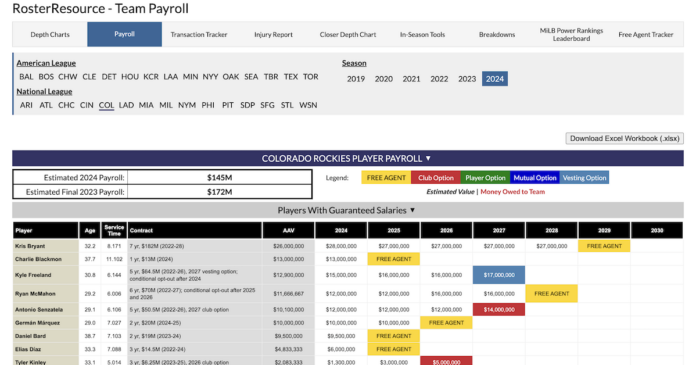On the very first day of my freshman year of college, my Journalism 101 professor quoted a line from All the President’s Men: “Follow the money.” Over four years as an undergrad, I’d hear that maxim more times than I could count. Enough that after more than 10 years in the business, it’s been incorporated into my subconscious so thoroughly that I can hear my old professors and mentors (and sometimes Hal Holbrook) repeating it without needing them to be physically present.
Obviously, we at FanGraphs would like nothing better than for some of your money to be spent on a Membership. Your support funds valuable tools like the RosterResource payroll pages, my favorite way to follow that famous principle of journalism.
You’re likely familiar with each team’s RosterResource Depth Chart, which is obviously valuable because it’s so exhaustive. But click over to that second tab, and you’ll find the contract situation for everyone on the major league roster:
For good or bad, roster construction in baseball over the past 20 years has turned into a resource management game. And for a sport with no salary cap, there are a lot of rules to follow. Any analyst worth their WordPress login has to know the luxury tax boundaries, and keep track of who gets paid what and for how long. Fans, too. In short, if you don’t know money, you don’t know ball.
In this first section alone, you’ll find every player with a guaranteed contract’s year-by-year salary, as well as their contract AAV for tax purposes, which is adjusted to account for deferrals. (This last point has become highly relevant in the wake of Shohei Ohtani’s not-really-$700-million contract this past winter.) And it’s all organized in one highly legible, color-coded table, tracking not just contract duration but options.
Scroll down a little and you’ll find each team’s pre-free agency players — where they are in the arbitration process, how much money they make, and how much longer they’re under team control. Next time a small-market team trades a star for five Quad-A guys and crows about “trading one year of team control for 29 years of team control,” this is where you can go to check their math:

Everyone understands that statistical leaderboards are important, but having all this information sorted by team and contract type, available not only for perusal but also for download, is a force multiplier when it comes to understanding why teams are built the way they are.
And that’s not all. You can’t just add up players’ salaries, or even their AAVs, in order to understand a team’s tax situation. There’s all manner of other expenditures and charges that make up a team’s liability against the competitive balance tax. In the days before FanGraphs brought RosterResource into the fold, I got in trouble once or twice by forgetting to incorporate player benefits or retained salary into my analysis. No longer:

Everything you need to know about the present and future payroll situations for all 30 teams. And that’s just one tab out of nine. Click over to the Breakdowns tab and you’ll get sortable tables regarding roster composition for all 30 teams: How many players were acquired in trade, free agency, and so on. There’s also a sortable ranking of each team’s payroll obligations, both in real dollars and against the CBT, plus payroll commitments for the next three years. (Breakdowns does not include any data on the hit single by turn-of-the-century grunge band Tantric, but I think we can all agree that omission is an act of mercy.)

I won’t even get into the Free Agent Tracker or the various transaction logs or the Depth Charts. Any one of those could merit its own post.
Follow the money. The RosterResource payroll pages might not turn you into Woodward and Bernstein overnight, but they’ll keep you from looking like an ignorant buffoon when you’re talking about baseball.

